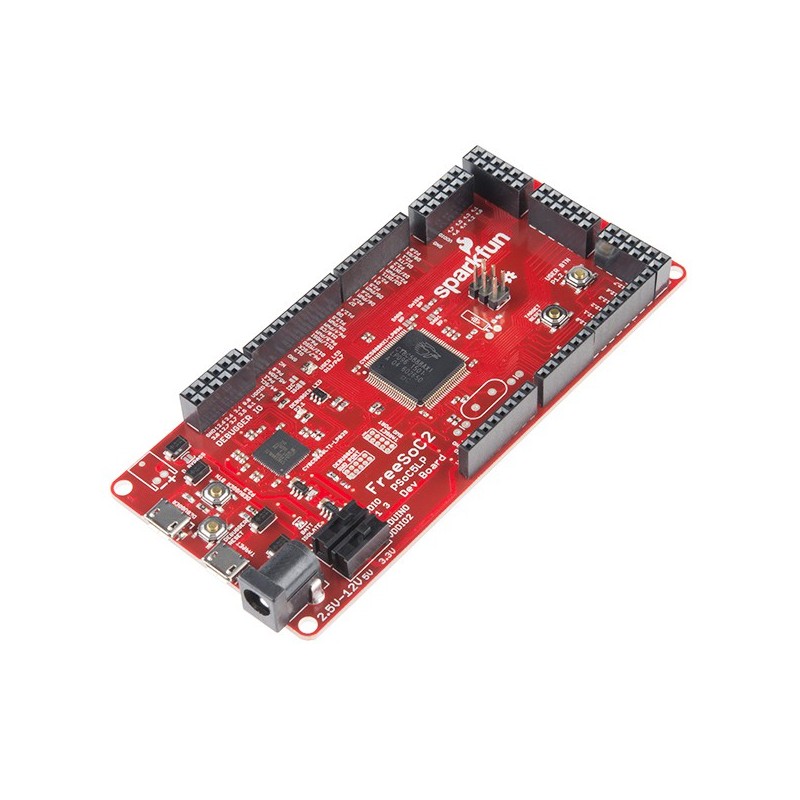- Out-of-Stock






FreeSoC2 board has two processors on-board: a CY8C5868LTI-LP039 and a CY8C5888AXI-LP096. The former serves as a debugger/programmer for the latter, which is the target upon which your application code will be installed. Both parts contain a Cortex-M3 processor core, 256kB of flash memory, 64kB of SRAM, and 2kB of EEPROM. DEV-13229
FreeSoC2 Development Board - PSoC5LP
Description:
This is the FreeSoC2 Development Board, SparkFun’s take on the PSoC5LP ARM Cortex. The PSoC (Programmable System on a Chip) brings together features of the programmable devices and microcontroller-type systems on chips into one package. By placing a programmable fabric between the peripherals and the pins, the FreeSoC2 allows any function to be routed to any pin! Moreover, the on-board PSoC includes a number of programmable blocks which allow the user to define arbitrary digital and analog circuits for their specific application.
SparkFun’s FreeSoC2 board has two processors on-board: a CY8C5868LTI-LP039 and a CY8C5888AXI-LP096. The former serves as a debugger/programmer for the latter, which is the target upon which your application code will be installed. Both parts contain a Cortex-M3 processor core, 256kB of flash memory, 64kB of SRAM, and 2kB of EEPROM. The only significant difference between the two are package size and clock speed. The target is in a TQFP-100 package which provides 72 IO pins versus the debugger’s QFN-68 package and 48 IO pins, and the target can operate at 80MHz versus the debugger’s 67MHz limit. Additionally, the FreeSoC2 can support 5V and 3.3V IO voltages.
With a simple upload of new firmware, the Arduino core has been ported to the PSoC5LP, so you can write code for the board in the standard Arduino IDE. The board duplicates the functionality of an Arduino Uno R3’s various hardware peripherals on the pins, so many examples, libraries, and shields will work on this board. However, to get the most out of the device, you will need to use the PSoC Creator IDE (which is free of charge with no code limits from Cypress Semiconductor). Please keep in mind that the PSoC Creator software is Windows-only at this time.
Note: The FreeSoC2 Develpment Board is a collaboration with Jon Moeller. A portion of each sales goes back to him for product support and continued development.
Features:
Documents:
Manufacturer BTC Korporacja sp. z o. o. Lwowska 5 05-120 Legionowo Poland sprzedaz@kamami.pl 22 767 36 20
Responsible person BTC Korporacja sp. z o. o. Lwowska 5 05-120 Legionowo Poland sprzedaz@kamami.pl 22 767 36 20
FreeSoC2 board has two processors on-board: a CY8C5868LTI-LP039 and a CY8C5888AXI-LP096. The former serves as a debugger/programmer for the latter, which is the target upon which your application code will be installed. Both parts contain a Cortex-M3 processor core, 256kB of flash memory, 64kB of SRAM, and 2kB of EEPROM. DEV-13229
No product available!
32-bit microcontroller with ARM Cortex-M4 core, XMC4200 family, 256kB Flash, VQFN-48, Infineon
No product available!
Aluminum extensometer beam, allowing measurement of weight up to 1 kilogram. It has four wires. It is used in kitchen scales and portable scales.
No product available!
Aluminum extensometer beam, allowing weight measurement up to 3 kilograms. It has four wires. It is used in kitchen scales and portable scales.
No product available!
Aluminum extensometer beam, allowing mass measurement up to 5 kilograms. It has four wires. It is used in kitchen scales and portable scales.
No product available!
The set allows introducing distance, ambient lighting and gesture analysis into the subject using the VL6180X sensor. NUCLEO-L053R8 plate in set with VL6180X expansion board. P-NUCLEO-6180X2
No product available!
Shield for STM32 Nucleo, has two MP34DT01-M digital microphones made in MEMS technology
No product available!
9-inch display with universal HDMI interface and 10-point multitouch capacitive screen
No product available!
Load Cell Amplifier is a small breakout board for the HX711 IC that allows you to easily read load cells to measure weight. SEN-13230
No product available!
No product available!
Bluetooth module for mounting in SMD technology with a fully configurable UART interface - transfer speed up to 2 Mb / s. WRL-11786
No product available!
The LCD Button Shield V2 attaches to your Arduino to provide a 16x2, black character, green back light LCD with a keypad consisting of 5 keys — select, up, right, down and left. With this shield you will be able to move through menus and make selections straight from one board attached to your Arduino without requiring a massive tower of shields. DEV-13293
No product available!
Nintendo DS Screen Kit joins two of our more unique products together to provide you with an easy means to equip your next project with touchscreen functionality. Inside each kit is one Nintendo DS Touchscreen and one SparkFun Touchscreen Connector Breakout. LCD-13631
No product available!
MG2639 SparkFun Cellular Shield is a perfect addition to any Arduino project that requires connectivity when there’s no WiFi or Ethernet access nearby. The ZTE MG2639 module, which this shield is built around, supports SMS, TCP, UDP, and can even be used to make or receive phone calls. CEL-13120)
No product available!
No product available!
Module with analogue UV light sensor ML8511. It enables the measurement of the radiation intensity for the UV-A (320-400nm) and UV-B (280-320nm) waves. Analog interface. DFRobot SEN0175
No product available!

FreeSoC2 board has two processors on-board: a CY8C5868LTI-LP039 and a CY8C5888AXI-LP096. The former serves as a debugger/programmer for the latter, which is the target upon which your application code will be installed. Both parts contain a Cortex-M3 processor core, 256kB of flash memory, 64kB of SRAM, and 2kB of EEPROM. DEV-13229
